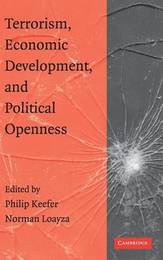
|
Terrorism, Economic Development, and Political Openness
Hardback
Main Details
| Title |
Terrorism, Economic Development, and Political Openness
|
| Authors and Contributors |
Edited by Philip Keefer
|
|
Edited by Norman Loayza
|
| Physical Properties |
| Format:Hardback | | Pages:328 | | Dimensions(mm): Height 229,Width 152 |
|
| Category/Genre | Development economics |
|---|
| ISBN/Barcode |
9780521887588
|
| Classifications | Dewey:338.9 |
|---|
| Audience | | Professional & Vocational | |
|---|
|
Publishing Details |
| Publisher |
Cambridge University Press
|
| Imprint |
Cambridge University Press
|
| Publication Date |
11 February 2008 |
| Publication Country |
United Kingdom
|
Description
To what extent are terrorism and development related? What are the relative weights of the economic, political, and social aspects of development? What is the development impact of different responses to terrorism? This volume addresses these crucial questions, synthesizing what we know about the development links with terrorism and pointing out what we do not. Contributors to this volume examine the economic and fiscal costs of terrorism and the response to terrorism. They conclude that the economic costs of terrorism in rich countries are low, relative to the economic costs of combating terrorism; both are likely high in poor countries. They also report evidence on how development affects terrorism. This work supports the hypothesis that political development - political openness and the quality of government - is inversely associated with the emergence of terrorist organizations, but not that poverty per se is directly responsible for terrorism.
Reviews'Terrorism is a global scourge that can often seem inexplicable. This superb volume, edited by Keefer and Loayza, turns the cold light of social science onto this hottest of topics. The book's essays teach us about the organization of terrorist units and the origins of terrorists and the costs of fighting terrorism. I can only hope that political decision-makers, from presidents to ordinary voters, read this book and use its wisdom to make better decisions about how to respond to terror.' Edward L. Glaeser, Harvard University 'Terrorism is one of the greatest challenges the world faces today, but we still do not have a clear idea of the relationships between it and economic development as well as between it and political openness. This book, which includes contributions by many leading authorities on the subject of terrorism, makes a major contribution to clarifying these relationships. It makes two important points: First, contrary to the view expressed by many, poverty is not directly responsible for terrorism. Second, greater political openness and better quality of government can inhibit the emergence of terrorist organizations as they are inversely associated with the emergence of such organizations. Clearly these relationships must be further investigated in some depth, and the book is a valuable guide to possible future research in this important area.' Michael D. Intriligator, University of California, Los Angeles 'An impressive roster of scholars offer a level of analysis in marked contrast to the continuing deluge of often superficial works on how to defeat terrorism. Along the way, they demolish some powerful myths - that terrorism is caused by individual poverty, or that terrorism is the outcome of irrational behavior - while raising fascinating new policy-relevant issues. Full of insights, my copy is heavily underlined. Bravo!' Brian Jenkins, RAND Corporation
|